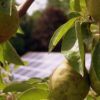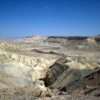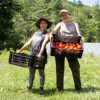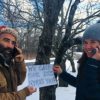by Renee Ghert-Zand Every year, Ramah campers leave at the end of the summer having learned new things that they can incorporate into their lives at home. It could be more Hebrew, how to chant Torah, or how to do a layup on the basketball court. In the last decade, campers have also been coming away with a heightened awareness and deeper understanding about where their food comes from, and how their eating choices impact their bodies and the environment. “We are trying to lift the veil on where our food comes from,” said Rabbi Eliav Bock, director of Ramah in the Rockies, one of the Ramah camps at the forefront of making its food sourcing more transparent and helping children and young adults make more informed decisions in nurturing themselves and taking care of the earth. Ramah camps, as well as the USY on Wheels summer program, are increasingly incorporating experiential educational opportunities for learning about concepts like organic farming, ethically sourced meat, fair trade practices, farm to table eating, waste reduction, and composting — all couched within the outstanding Conservative Jewish educational framework for which these summer programs are known. A number of the Ramah camps have […]
















